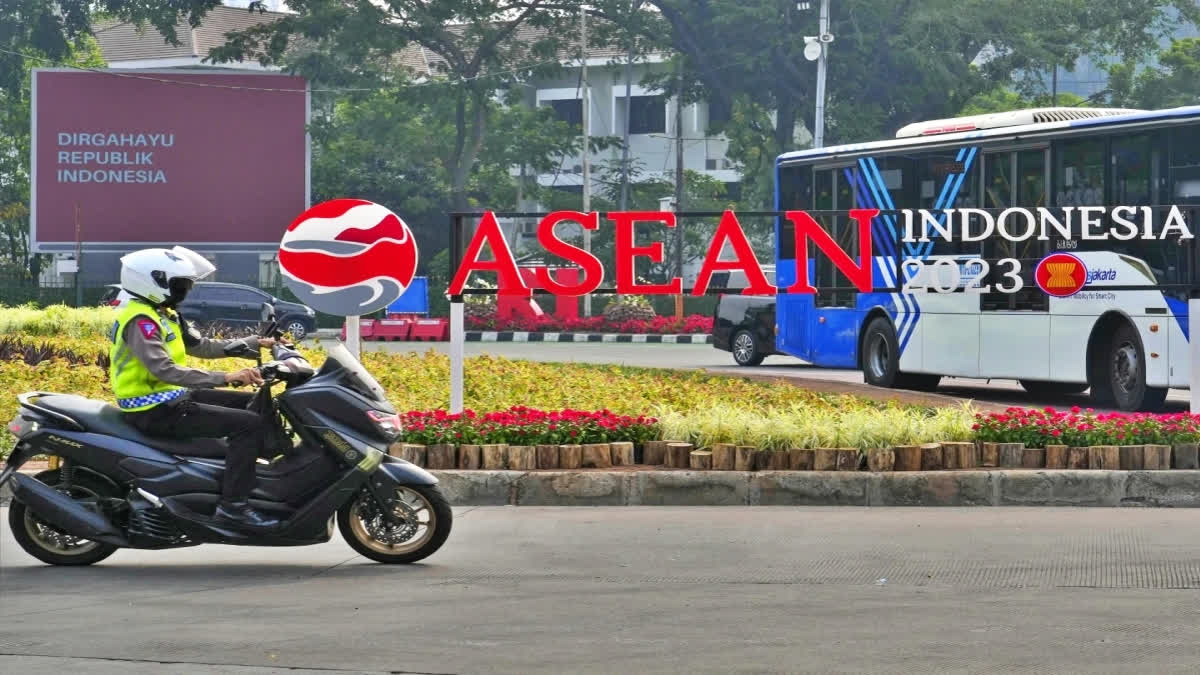New Delhi: With India opting out of the Regional Comprehensive Economic Partnership (RCEP, it is time to review the Association of South East Asian Nations (ASEAN)-India Free Trade Area (FTA) agreement.
This was the view put forward by experts in a webinar with the theme ‘ASEAN Summit Process and Associate Meetings: Issues and Way Forward’ organised by the New Delhi-based think tank Research and Information Systems (RIS) for Developing Countries on Monday ahead of the ASEAN-India Summit to be held in Indonesia later this week.
There has been a lot of talk about reviewing the ASEAN-India FTA as India’s trade with ASEAN nations had gone from surplus to deficit after the ASEAN-India Framework Agreement on Comprehensive Economic Cooperation was signed in 2003. The agreement provides the mandate for the creation of an ASEAN-India Free Trade Area. Subsequently, under its provisions, an ASEAN-India Trade in Goods Agreement came into force in 2010.
Following this, an ASEAN-India Agreement for Trade in Services and an ASEAN-India Agreement on Investment were also signed and ratified by all parties. In 2010-11, when the ASEAN-India Trade in Goods Agreement came into effect, trade between India and the Southeast Asian bloc of 10 nations stood at $57 billion. It took more than a decade for this figure to reach $131 billion in 2022-23.
During this period, India’s exports to ASEAN increased from $25.63 billion in 2010-11 to $ 43.51 billion. At the same time its imports also increased from $30.61 billion to $87.59 billion in the same period resulting in a trade deficit.
This is what is compelling India to take a relook at the FTA. In fact, this is one of the reasons why India pulled out of the negotiations to join the RCEP. India exited the RCEP grouping in November 2019, saying it wanted to protect its economy from rising trade deficits with a number of RCEP members. India’s decision is still the subject of much debate, and the RCEP has left a window open for India to rejoin at a future date.
The RCEP is a free trade agreement between Australia, China, Japan, New Zealand, South Korea and the 10 ASEAN member states – Brunei, Cambodia, Indonesia, Laos, Malaysia, Myanmar, the Philippines, Singapore, Thailand and Vietnam. The 15 member countries account for about 30 per cent of the world's population (2.2 billion people) and 30 per cent of global GDP ($29.7 trillion), making it the largest trade bloc in history.
Speaking in Monday’s webinar, Dato Ramesh Kodammal, co-chair of the ASEAN-India Business Council, said that with India pulling out of the RCEP, it is time to review the ASEAN-India FTA agreement and address New Delhi’s concerns. “The ASEAN-India FTA has not been reviewed for so many years,” Kodammal said. “India wants to review the ASEAN-India FTA on the same terms as RCEP. It is not possible for ASEAN to leave out China. At the same time, ASEAN needs India too.”
He said that with the Indian economy set to grow over the next 15-20 years, ASEAN will have to work with the South Asian giant. “India has a very young population,” Kodammal said. “This is a great advantage for ASEAN. We want Indian industries to come and invest in ASEAN countries.”
He said that small and medium enterprises (SMEs) can play a major role in this. It may be mentioned that the SMEs make up almost 40 per cent of India’s export business and a significant chunk of the country’s manufacturing output (45 per cent). India has the second largest number of SMEs in the world, eclipsed only by China.
“India can support ASEAN countries for food security,” Kodammal said. “ASEAN can also learn a lot about fintech from India.” Pranav Kumar, vice-president of international trade policy and compliance in Reliance Industries, said that though India hosted two rounds of RCEP negotiations, it pulled out of the grouping as a majority of its concerns were not addressed.
“After withdrawing from the RCEP, India has changed its FTA (free trade agreement) strategy,” Kumar said. “There has been no talk at the government level about the RCEP. So, India joining RCEP is unlikely.” However, he said that ASEAN-India cooperation in digital economy is very important. “The private sector has played a major role in this,” Kumar explained. “We have developed a strong technology for UPI (Unified Payments Interface). Singapore has already partnered with us.”
He also said that India has a lot to offer to ASEAN nations in terms of cooperation in the space sector. In this connection, Surat Horachaikul, Director of the Indian Studies Centre at Chulalongkorn University in Thailand, said ASEAN-India ties should also be looked from outside the economic realm and focus on science and technology.
“People in our country were very excited about the success of India’ Chandrayaan 3 mission,” he said. “I think India is very ‘sexy’ in this aspect.” However, Intan Ramli, senior policy fellow in the Policy Design Department of the Economic Research Institute for ASEAN and East Asia (ERIA) in Jakarta, believes that India should still consider joining the RCEP.
“One option is to have bilateral FTAs (with individual ASEAN member states),” she said. “But it will be more expensive.” Ramli was of the view that ASEAN and India should deepen cooperation in modern areas like digital economy, e-commerce, circular economy, green investment and intellectual property rights (IPRs). “Intensifying cooperation in the services sector is also important,” she said. “Both sides should also negotiate for market access in agricultural and food products.”
Also read: AIME testimony to India's deep linkages with ASEAN countries, says envoy Shilpak Ambule


